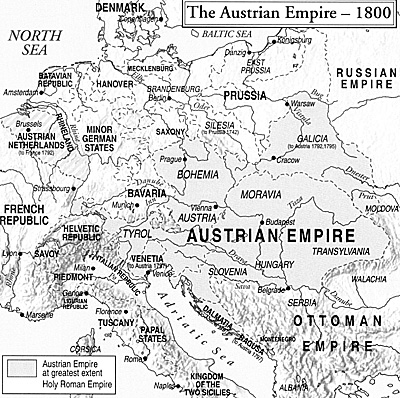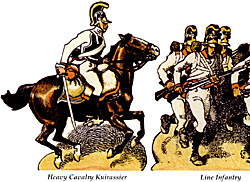 Although the shell of the Holy Roman Empire lingered still in 1792, to be abolished by Napoleon on 6 August 1806, its core was the Austrian Empire, itself a multiethnic, "dynastic collection of lands" united under Habsburg rule. Embracing Germans, Magyars, Czechs, Italians, Romanians, Slovaks, Flemings and Walloons, Poles, Croats, and Serbs (including interests in a host of other minor German principalities), such diversity created complicated internal politics and inculcated an intense conservatism within the privileged Austrian court which found itself dedicated, above all else, to preservation of the "Austrian Monarchy."
Although the shell of the Holy Roman Empire lingered still in 1792, to be abolished by Napoleon on 6 August 1806, its core was the Austrian Empire, itself a multiethnic, "dynastic collection of lands" united under Habsburg rule. Embracing Germans, Magyars, Czechs, Italians, Romanians, Slovaks, Flemings and Walloons, Poles, Croats, and Serbs (including interests in a host of other minor German principalities), such diversity created complicated internal politics and inculcated an intense conservatism within the privileged Austrian court which found itself dedicated, above all else, to preservation of the "Austrian Monarchy."
Nevertheless, the Empire's patchwork population of 27 million provided Napoleon's most enduring Continental enemy, supplying the largest army most continually engaged against France. Austrian Imperial finances were also complicated, and British military subsidies were crucial. With the death of Emperor Leopold II in 1792, it fell to Franz II (1768-1835), who adopted the title Franz I of Austria in 1804, to hold together and promote the dynastic interests as Emperor and King. His innate distrust of undue military competence (and its potential political threat) led him to repose his confidence in less spectacular commanders and in civilians.
At his elbow from 1793-1800 as foreign minister was Baron Johann Amadeus Thugut; from 1809, as foreign minister (1809-1811) and chancellor (1811-1848), was Count (later Prince) Clemens Wenzel Lothar Metternich-Winneburg (1773-1859). The latter was an admirer of Napoleon's effective administration and civic accomplishments while ambassador to Paris (1806-1809), and was chiefly responsible for arranging Napoleon's marriage to the Austrian Emperor's daughter, Marie-Louise. A personification of balance of power politics, Metternich juggled a paradoxical appreciation for France's place in Europe, while simultaneously opposing Napoleon's overweaning ambition.
 Throughout the wars, the Hofkriegsrat, or war council, directed military affairs on the Emperor's behalf -- with a stultifying influence on military reform and developments. Austria's chronic conflicts with the Ottoman Empire had developed a tough army, but its generals' tactical and strategic outlooks remained mired in an earlier age, with the notable exception of the Emperor's brother, Archduke Karl (Charles), perhaps Austria's most successful battlefield commander of the period.
Throughout the wars, the Hofkriegsrat, or war council, directed military affairs on the Emperor's behalf -- with a stultifying influence on military reform and developments. Austria's chronic conflicts with the Ottoman Empire had developed a tough army, but its generals' tactical and strategic outlooks remained mired in an earlier age, with the notable exception of the Emperor's brother, Archduke Karl (Charles), perhaps Austria's most successful battlefield commander of the period.
Karl's two periods of reform (1801-1805 and 1806-1809) provided crucial military improvements to the royal army. Although the Empire suffered dramatic defeats in 1796-1797, 1800, 1805, and 1809, and was forced to provide auxiliary forces to Napoleon's invasion of Russia in 1812, it also accrued an honorable string of victories against France, gave Napoleon his first battlefield defeat at Aspern-Essling in 1809, and rose repeatedly from its disasters to confront and finally help defeat Napoleonic France.
More Powers of the Napoleonic Era
- France
Great Britain
Duke of Wellington Profile
Austria
Archduke Charles Profile
Russia
Field Marshal Kutusov Profile
Prussia
Field Marshal Blucher Profile
Spain
The Peninsula War
Ottoman Empire
Minor Powers
Back to Table of Contents -- Napoleon #17
Back to Napoleon List of Issues
Back to MagWeb Master Magazine List
© Copyright 2001 by Napoleon LLC.
This article appears in MagWeb (Magazine Web) on the Internet World Wide Web.
The full text and graphics from other military history magazines and gaming magazines are available at http://www.magweb.com
Order Napoleon magazine direct